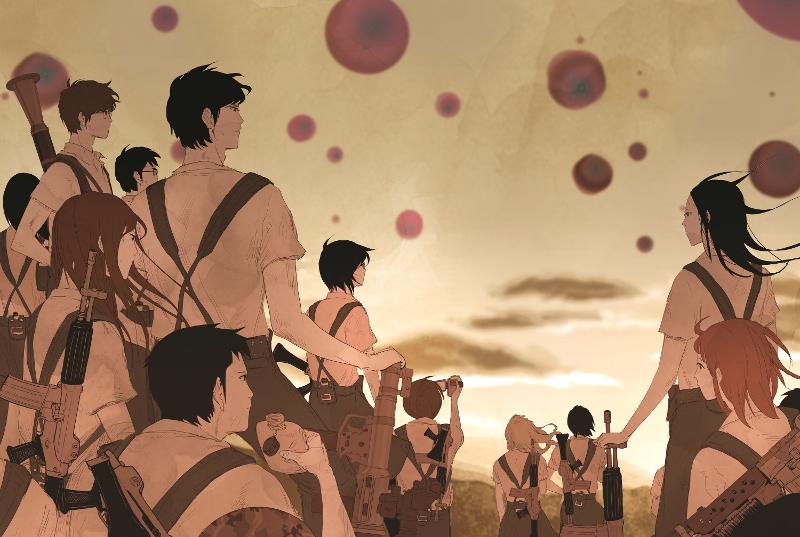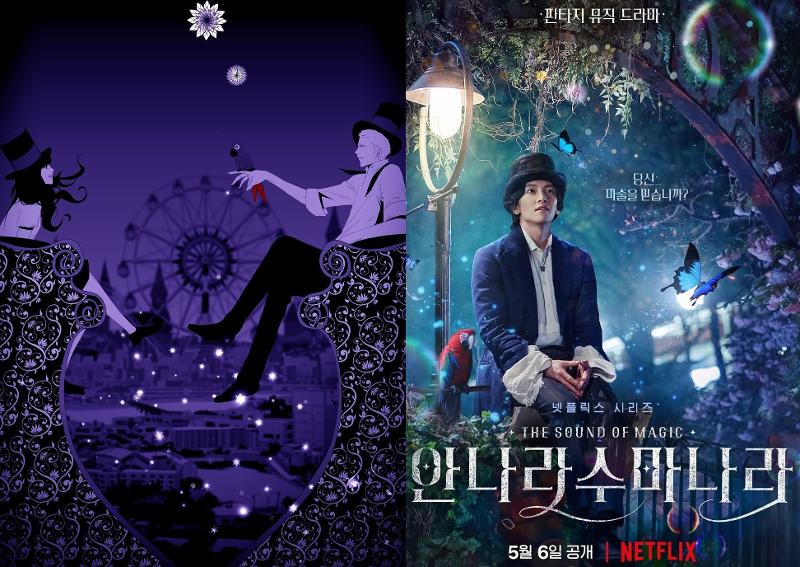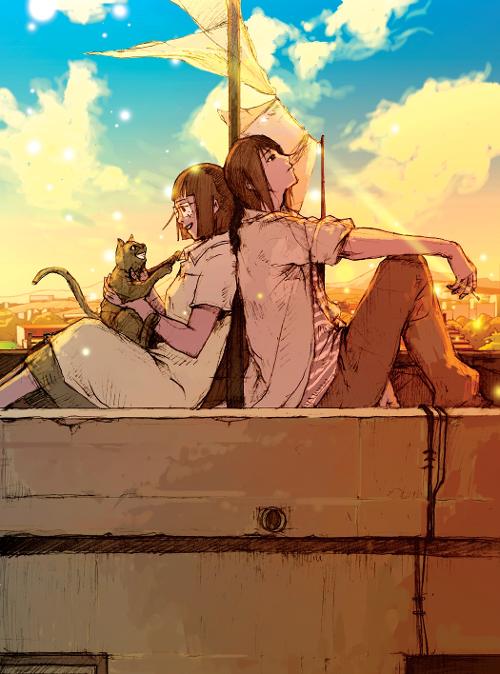
This scene is from webtoonist Ha Il-kwon's "Duty After School," a 2012 science-fiction thriller about students forming military reserves to fight unidentified round objects that infiltrate Earth from space. In March, a TV series based on this webtoon was released on the domestic online streaming service Tving. (Ha Il-kwon)
By Yoo Yeon Gyeong
"I realized that a happy life without dreaming is just as valuable and precious as a life in pursuit of a dream. I've since stopped creating works with a dream theme."
Ha Il-kwon has created 13 webtoons and around 50 comic books and won seven honors, including the Minister of Culture, Sports and Tourism Award in the cartoon category at the 2019 Korea Content Awards. Just about every work of his has achieved success including his debut work "Sambong Barber Shop" (2006), "Three-Part Transformation: Kim Chang-Nam" (2008), "Sound of Magic (Annarasumanara)" (2010), "God of Bath" (2011) and "Duty After School" (2012).
The success of these works has earned him nicknames like "Midboha," short for the phrase "Believe in Ha," "webtoon president" and "god of directing."
His main theme was dreams up to "God of Bath," but since "Duty After School," he has delved into topics that he had not covered before.
Korea.net on Aug. 28 interviewed Ha, who is expanding the horizons of his webtoons to more genres and themes.
"Sambong Barber Shop," "Three-Part Transformation: Kim Chang-Nam" and "God of Bath" were praised for connecting ordinary materials with creative ideas. Where do you get inspiration for your webtoons?
I get them from daily life. The life of a webtoonist is extremely monotonous. I have to create something when there's nothing new each day, so I try as much as possible to think of topics from even the smallest aspects of my daily life. Is it interesting to look at a topic easily encountered in everyday life from another perspective? I always tend to think this way.
"Sound of Magic (Annarasumanara)" and "Duty After School" have been made into TV series and "Sambong" into a theatrical play. Having created these works, what do you think of their productions?
I feel great joy as the original creator when my works are adapted into other media. Of course, I've enjoyed watching all the adaptations. The secondary creations are taken out of my hands and remade through reinterpretations by directors. It's interesting how other creators reinterpret and adapt my works.

Webtoonist Ha Il-kwon's 2010 work "Sound of Magic (Annarasumanara)" was made into an original Netflix music drama last year, a production that ranked fourth on the streaming site's list of TV shows within two days of release and topped the Netflix charts in 13 countries including Bangladesh, Indonesia and Jordan. Left is a scene from the webtoon and right is the promotional poster for the series. (Ha Il-kwon and Netflix)
Why do many of your works have dreams as their theme?
For a while, "dream" was the main theme of my works and what I considered the most important value in my life. Just hearing that word made my heart throb and flutter and I thought it was wonderful. But since growing older and with changing times, I think the value of dreams has slightly changed.
What was most shocking is that not so many people have dreams and try to make them come true. Not everyone has a dream that they want to devote their lives to or sacrifice everything to achieve. And there was a moment when I realized that living a happy life without dreams and pursuing a dream-driven life are equally valuable and precious.
Do you read comments on your webtoons, and if so, do you remember any?
In the past, I read almost all of them but now just a few due to various circumstances. No comments in particular stand out but I do have a type I like.
I'm grateful for long comments that describe readers' thoughts, but I also like comments written out of instinct when readers find my webtoon both funny and interesting, such as "kkkkkk" (the Korean equivalent to the acronym "lol"). It shows that my work was that fun.

This scene is from Ha Il-kwon's debut webtoon "Samsong Barber Shop" released in 2006. (Ha Il-kwon)
The webtoon is a major part of Korean content but copyright protection for it has received little interest. As a webtoonist, what do you consider the most crucial element of such protection?
I think reader awareness is most important. Gradually, what's important is a higher number of readers to think of the creators by not reading webtoons on illegal websites and consume the official versions.
As a webtoonist for 18 years, what do you think is the appeal of Korean webtoons?
I think their biggest appeal and strength are how the format of comics as a medium has changed fluidly and successfully settled along with the development of the internet and mobile devices.
In the past, the barriers to releasing and officially serializing comics were quite high but webtoons lowered those barriers. Today, more diverse, new and unconventional works are available. I think these factors are behind the success of our webtoons.
What webtoon do you recommend to people abroad unfamiliar with the genre?
I recommend "Sound of Magic (Annarasumanara)." Of course, it's easy to access because it was made into a Netflix series but I put a lot of effort into its scroll production to ensure wider appeal.
dusrud21@korea.kr
![[Interview with webtoonist ④] From law school failure to testing limits via content](/upload/content/image/8a64efb6e27444fb83b71a3f574f5f8b_20230906155207.jpeg)
![[Interview with webtoonist ③] Maanchwee adds unique 'senses' to her works](/upload/content/image/50041cf7ca3c4559b1a60252f7081add_20230814090914.jpg)
![[Interview with webtoonist ②] 'Please draw as well as read webtoons'](/upload/content/image/16d70b129ed246d1a0105f690a05cd96_20230803135836.jpg)
![[Interview with webtoonist ①] Showing dark side of humans](/upload/content/image/f3775531256e4abcad295ba723dfcd59_20230720074252.JPG)